December 1, 2016
Paris-based container farming startup, Agricool, announced it has raised $4.3 million in a round led by the recently launched French venture capital firm, Daphni, along with Henri Seydoux, the founder of drone company, Parrot, and Jean-Daniel Guyot, co-founder of Captain Train.
Founded by Gonzague Gru and Guillaume Fourdinier, Agricool has selected strawberries as its first crop – producing them using vertical surfaces within 30 square meter containers that employ a closed circulation system that uses only renewable electricity, filters the air brought in from outside the container, and eliminates the need for the use of pesticides. The system can also reduce 90 percent of water consumption, as it sets optimized levels of LED lighting, irrigation, and nutrient levels.
“Our mission is to bring back the original good tastes of fruits and vegetables,” said Fourdinier. “Each container can produce 120 times more fruits than on the same size of a piece of farm land. Moreover, our fruits contain more vitamins. As they do not contain harmful chemical residues, it is not necessary to wash them before eating. Another huge advantage is that this container can be maintained by consumers with no agricultural experience, and Agricool can inspect the plants’ growing conditions and control water and nutrients level from a distance.”
Tech Crunch reports that the company is currently leasing warehouse space to house their containers, however, the company is aiming to deploy 75 containers throughout the city of Paris by the end of next year with a production goal of 91 tons of strawberries. Longer term, Agricool foresees expanding to include other fruits and vegetables as it expands geographically.
“We’ll go first to big cities around Europe, and then worldwide,” Fourdinier told Snap Munk.
A New Category
Virtually unheard of only a few years ago, the production of fruit and vegetables in containers utilizing highly controlled closed systems has seen startups evolve on multiple continents and is beginning to gain investor attention.
Only last month GAI News reported that Australian startup Sprout Stack is preparing to open its second round of capital in a bid to raise further funding prior to commercializing its automated fresh food production container units in early 2017.
Much like Agricool, Sprout Stack’s units are standard intermodal shipping containers fitted with ready-to-use controlled environment agriculture systems that can monitor and control the produce at the click of a button or from the Sprout Stack web app.
Using vertical hydroponics with the highest quality lighting and climate systems to control moisture and CO2 levels, the containers are capable of growing the equivalent of two acres of fresh, sustainable produce in as little as eight weeks with the potential to produce in excess of 1,000 small heads of lettuce per week.
The spearhead of this new production model, however, has been Freight Farms located in Boston, Massachusetts. Established in 2010 as LED lighting became less cost prohibitive, Freight Farms now has 60 Freight Farms containers installed in 22 states and two Canadian provinces.Each Freight Farm contains 128 LED light strips along with an eight gallon tank of liquid fertilizer and a propane tank for producing supplemental CO2—all running on as little as 10 gallons of water and 80 kWh of energy per day – potentially producing approximately 50,000 mini-heads of lettuce a year.
Although apparently an answer to many challenges facing traditional agricultural production models, containerized food production is faced with a measure of pushback from consumers that are uneasy about food produced without sunlight.
“Introducing a new product into a market always has its challenges but if people actually stop and think about it, fresh produce not grown under the sun makes a difference only to your perception, not the end product,” Sprout Stack co-founder and director, Francisco Caffarena told GAI News. “What the consumer gets at the end of the day is ultimately even better produce because it is grown in a controlled pesticide-free environment, dramatically reducing the risk of contamination.”
—
Lynda Kiernan

Let GAI News inform your engagement in the agriculture sector.
GAI News provides crucial and timely news and insight to help you stay ahead of critical agricultural trends through free delivery of two weekly newsletters, Ag Investing Weekly and AgTech Intel.




